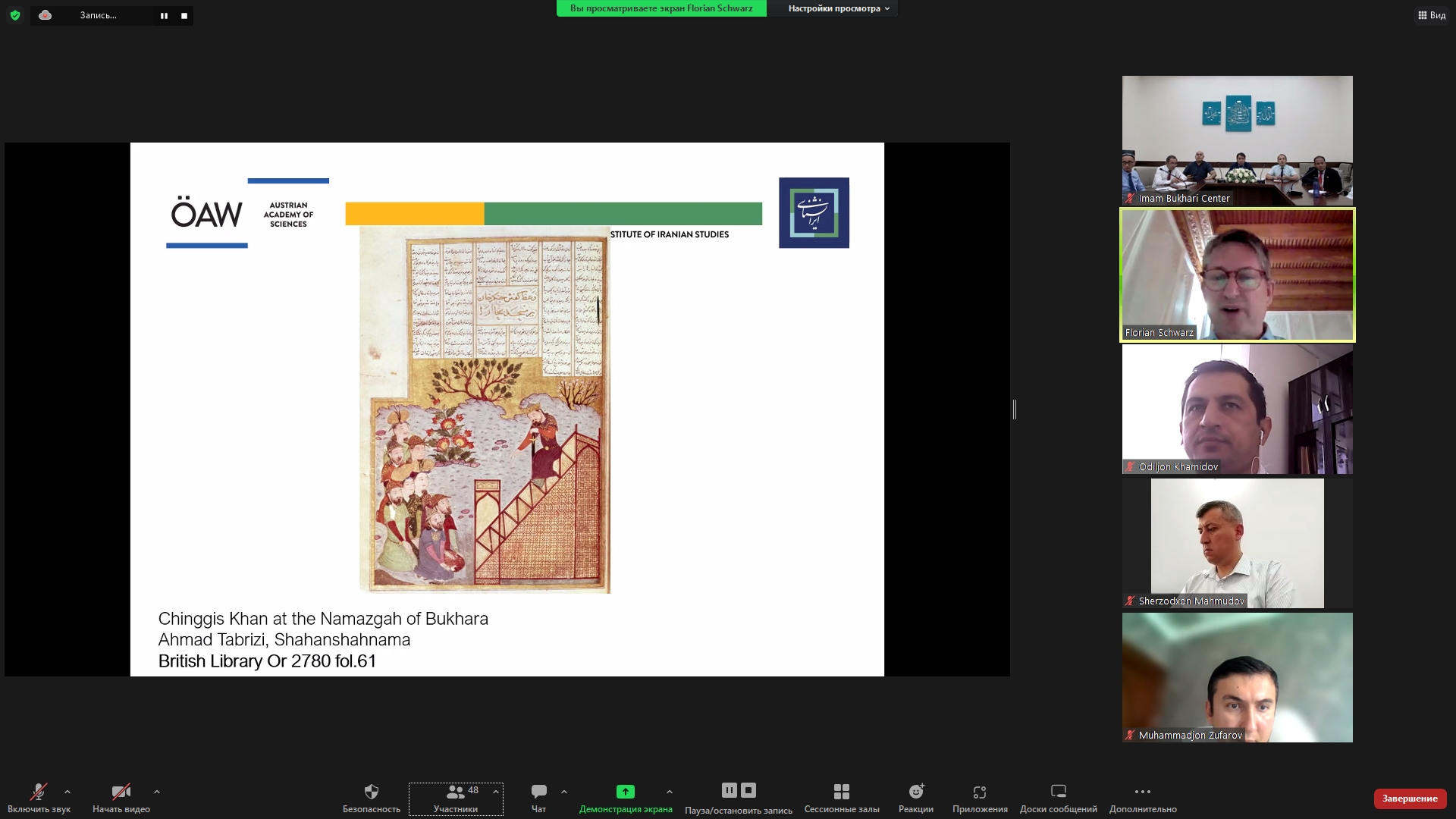Fourth Lecture Series on the History and Culture of Central Asia
During the summer semester 2022, the fourth
Lecture Series on the History and Culture of Central Asia
took place. The series of this semester was concentrated on the history and culture of the Zerafshan Region.
May. 24, 2022 - Zaynabidin Abdirashidov - "Jadidism in Bukhara: A New Look at the Early Activities of Abduruf Fitrat"
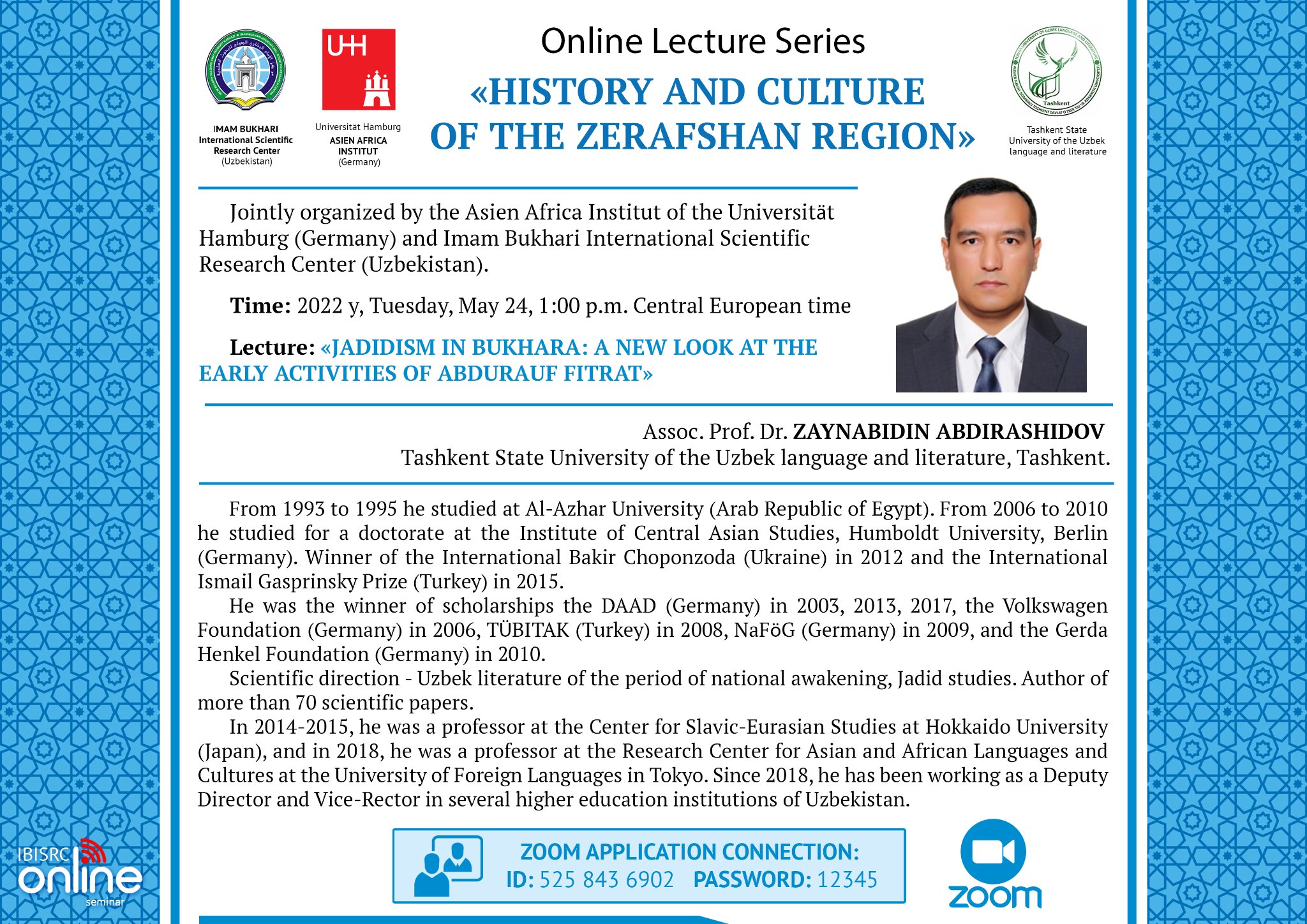
The fourth lecture series on the history and culture of Central Asia, titled "The History and Culture of the Zerafshan Region" jointly organized by Universität Hamburg and the Imam Bukhari International Scientific Research Center in Samarqand, began with a lecture by Prof. Zayn Abdidin Abdirashidov, Associate Professor at the Tashkent State University of the Uzbek Language and Literature in Tashkent, Uzbekistan.
The topic of the lecture, which took place online via Zoom on May 24, 2022 at 1pm CET, was: "Jadidism in Bukhara: A New Look at the Early Activities of Abduruf Fitrat".
Abstract:
The renewal and reform movement that began in the second half of the 19th century throughout the East went down in history as Jadidism among the Turkic peoples under the rule of the Russian Empire. The Jadid movement entered the Turkestan region in the early 20th century and quickly spread throughout the country. And thThe renewal and reform movement that began in the second half of the 19th century throughout the East went down in history as Jadidism among the Turkic peoples under the rule of the Russian Empire. The Jadid movement entered the Turkestan region in the early 20th century and quickly spread throughout the country. And this, in turn, paved the way for the emergence of leaders of this movement in Turkestan. One such intellectual was Abdurauf Fitrat from Bukhara. To date, a number of studies on the life, activities and heritage of Fitrat have been conducted and are being carried out in various scientific centers around the world. However, there are unresolved issues regarding Fitrat's early activities, especially his life in Istanbul.
The Lecture discusses Fitrat's entry into the Jadid movement, his initial ideological views, his activities in Istanbul, the creation of his works during this period, and the factors that influenced Fitrat's emergence as one of the ideological leaders of Turkestan. Jadidism and other related issues paved the way for the emergence of leaders of this movement in Turkestan. One such intellectual was Abdurauf Fitrat from Bukhara. To date, a number of studies on the life, activities and heritage of Fitrat have been conducted and are being carried out in various scientific centers around the world. However, there are unresolved issues regarding Fitrat's early activities, especially his life in Istanbul.
Bio of the Lecturer:
Prof. Zayn Abdidin Abdirashidov is one of the leading scholars of Uzbek literature in the period of national awakening, the Jadid studies. He authored of more than 70 scientific papers. In 2014-2015, he served as professor at the Center for Slavic-Eurasian Studies at Hokkaido University (Japan), and in 2018, he was a professor at the Research Center for Asian and African Languages and Cultures at the University of Foreign Languages in Tokyo. Since 2018, he has been working as a Deputy Director and Vice-Rector in several higher education institutions of Uzbekistan.
From 1993 to 1995 Prof. Abdirashidov studied at Al-Azhar University (Arab Republic of Egypt), and received his doctorate doctorate at the Institute of Central Asian Studies, Humboldt University, Berlin (Germany). He was awarded scholarships by the DAAD (Germany) in 2003, 2013, 2017, the Volkswagen Foundation (Germany) in 2006, TOBITAK (Turkey) in 2008, , and the Gerda Henkel Foundation (Germany) in 2010.
Jun. 14, 2022 - Rocco Rante - "New Research of the Bukhara during the Early Islamic Period"
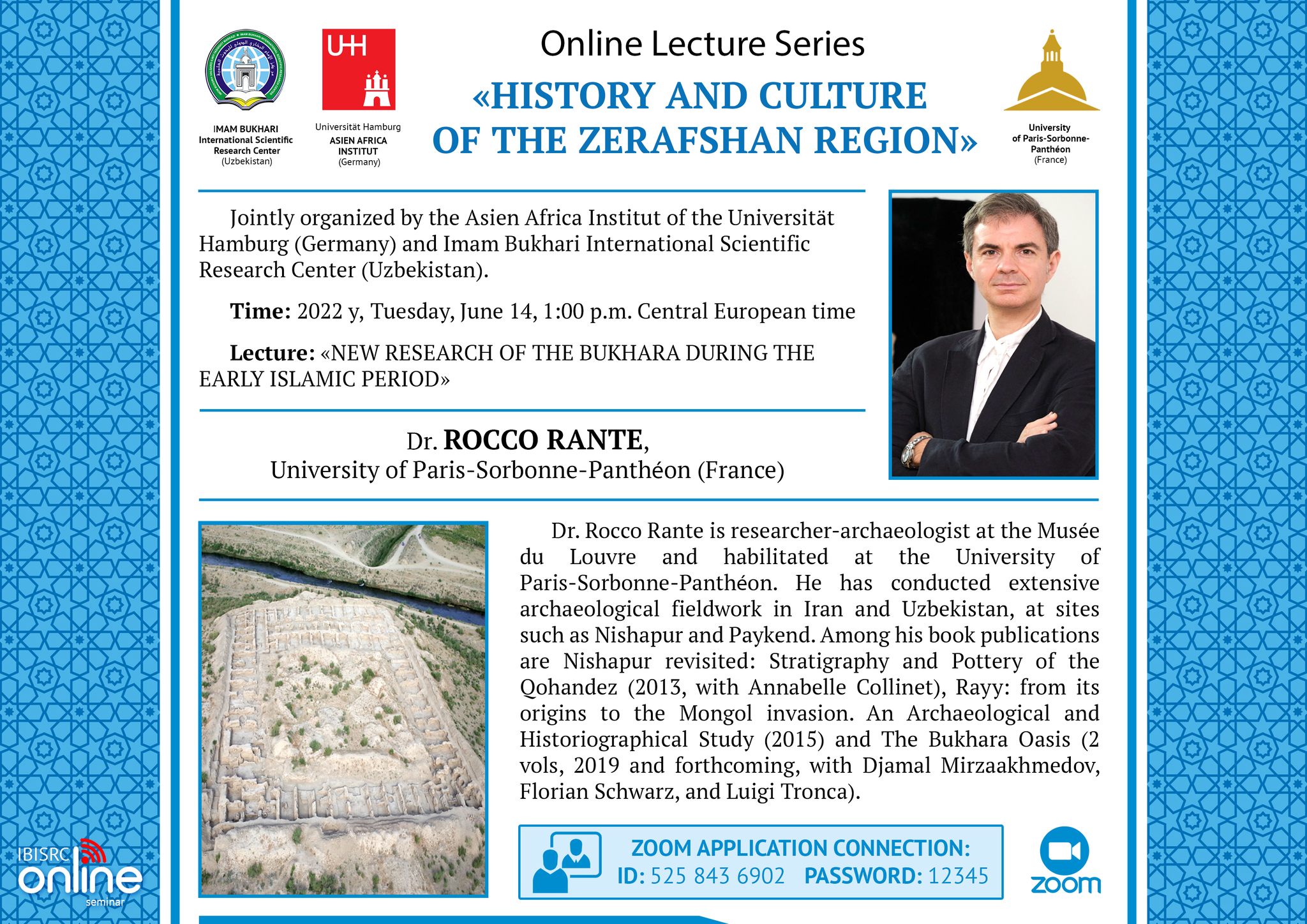
The topic of the lecture, which took place online via Zoom on June 14, 2022 at 1pm CET, was: "New Research of the Bukhara during the Early Islamic Period".
Short bio of the Lecturer:
Dr. Rocco Rante is researcher archaeologist at the Musée du Louvre, Paris, and habilitated at the University of Paris-Sorbonne-Panthéon . He has conducted extensive archaeological fieldwork in Iran and Uzbekistan at sites such as Nishapur and Paykend. Among his book publications are 'Nishapur revisted' (2013), Rayy: from its origins to the Mongol Invasion (2015), and the Bukhara oasis (2. Vols 2019 and forthcoming)
Jun. 21, 2022 - Akram Khabibullaev - "Muhammad Parsa's (d. 1420) Library. History and Overview of the Collection"
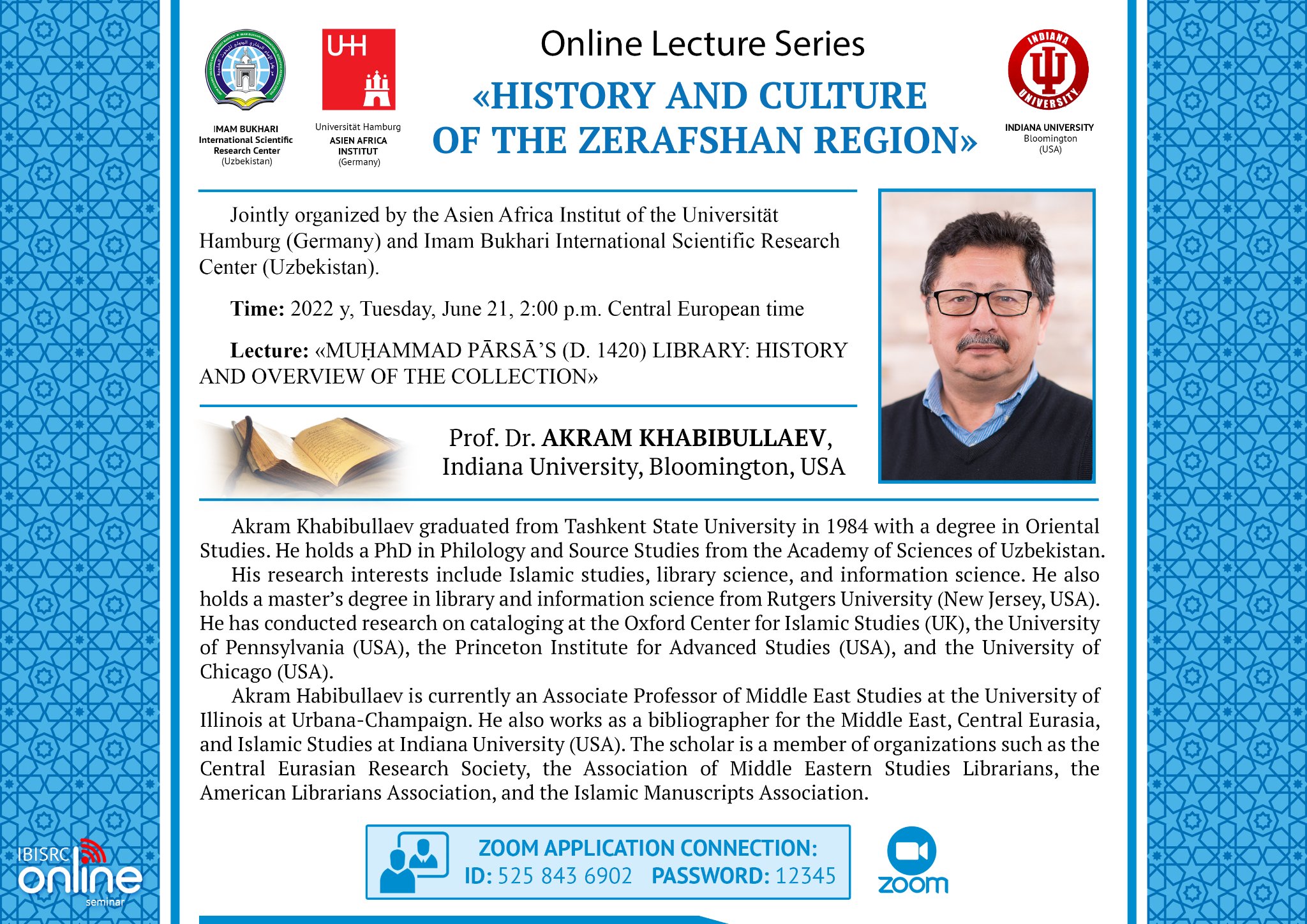
The third lecture of the series on "The History and Culture of the Zerafshan Region" was held by Prof. Akram Khabibullaev, from the Indiana University Bloomington, USA.
The topic of the lecture, which took place online via Zoom on june 21, 2022 at 2:00 pm (CET), was: "Muhammad Parsa's (d. 1420) Library. History and Overview of the Collection".
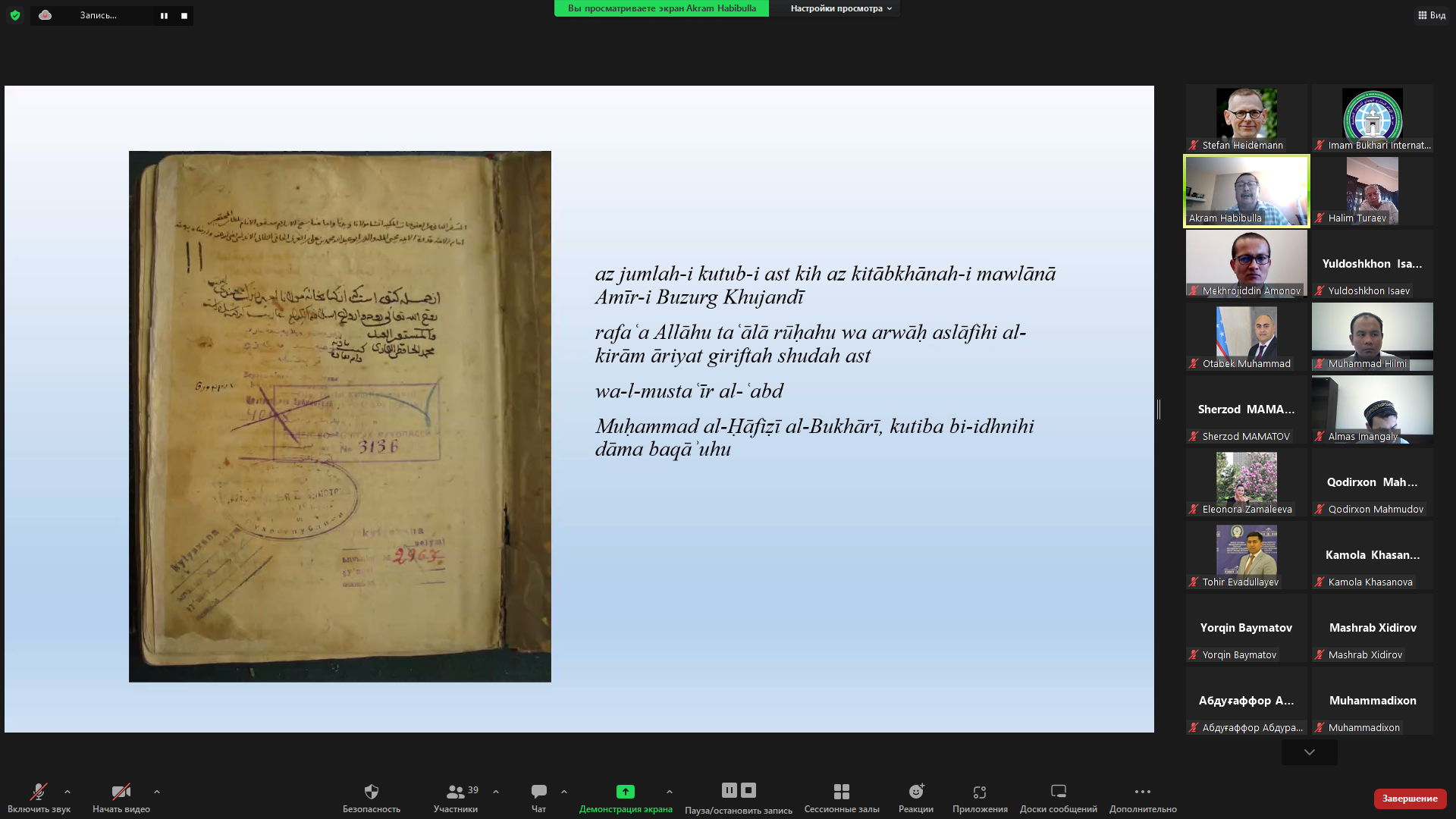
Bio of the Lecturer:
Akram Khabibullaev graduated from Tashkent State University in 1984 with a degree in Oriental Studies. He holds a Ph.D. in Philology and Source Studies from the Academy of Sciences of Uzbekistan. His research interests include Islamic studies, library science, and information science. He also holds a master’s degree in library and information science from Rutgers University (New Jersey, USA). He has conducted research on cataloging at the Oxford Center for Islamic Studies (UK), the University of Pennsylvania (USA), the Princeton Institute for Advanced Studies (USA), and the University of Chicago (USA). Akram Habibullaev is currently an Associate Professor of Middle East Studies at the University of Illinois at Urbana-Champaign. He also works as a bibliographer for the Middle East, Central Eurasia, and Islamic Studies at Indiana University (USA). The scholar is a member of organizations such as the Central Eurasian Research Society, the Association of Middle Eastern Studies Librarians, the American Librarians Association, and the Islamic Manuscripts Association.
Jul. 12, 2022 - Florian Schwarz - "Bukhara from Chingiz Khan to Buyan Quli Khan"
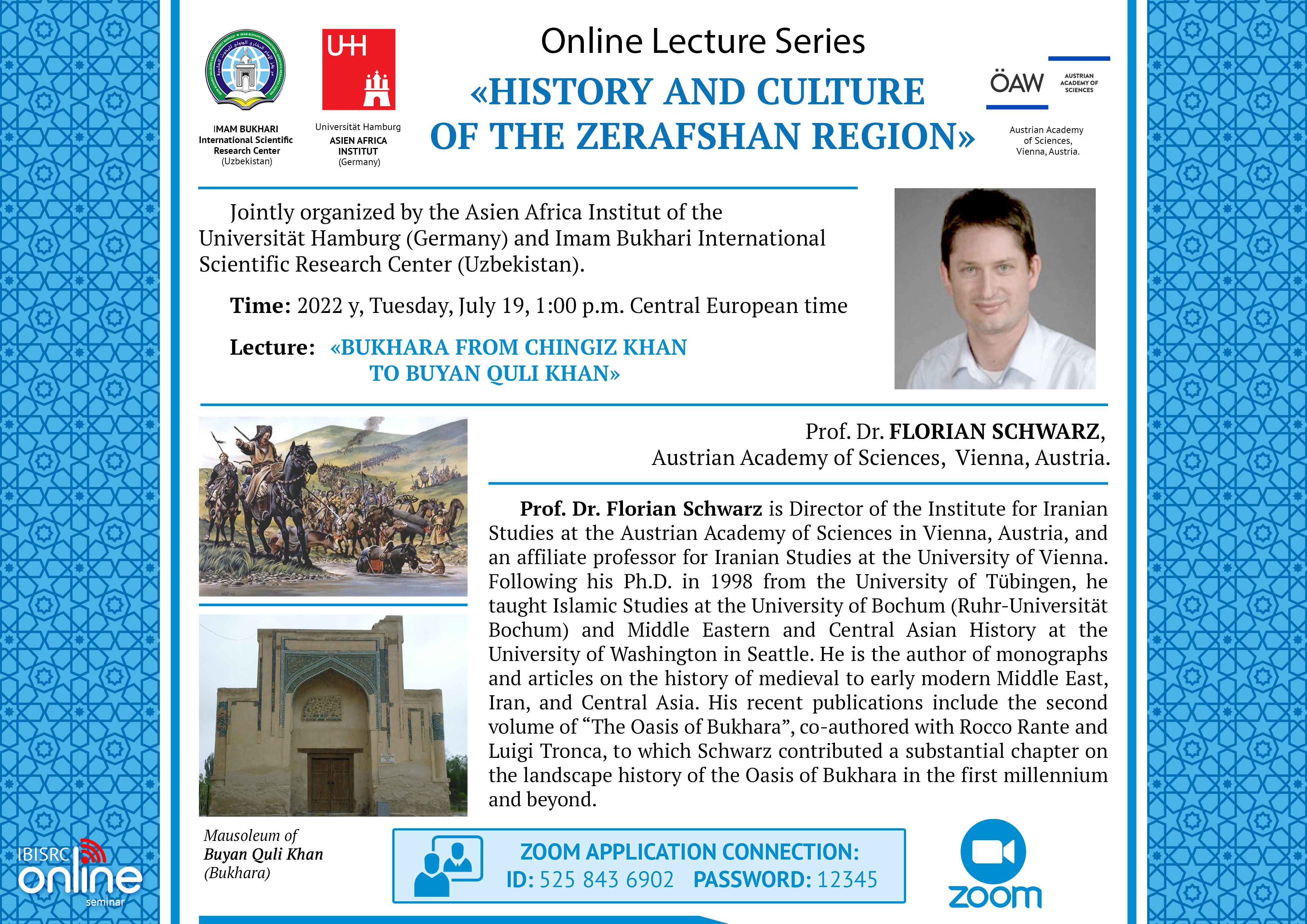
The topic of the lecture, which took place online via Zoom on July 19 th, 2022 at 1pm CET, was: "Bukhara from Chingiz Khan to Buyan Quli Khan".
Prof. Schwarz spoke about the religious and educational processes in Bukhara in the XIII-XIV centuries. In this period, the stages of development of the science of kalam and the teachings of Sufism are particularly noteworthy.
According to Professor Schwartz, the Mongol invasion did almost no harm to religious and educational development in Bukhara. Because the conquerors conquered Central Asia, which was not so scientifically and educationally developed, ignorant of the teachings of Islam, only by military force, and over time began to accept Islam. In this case, the traditions of kalam science and Sufi teachings developed in Bukhara had a severe impact on the Mongols.
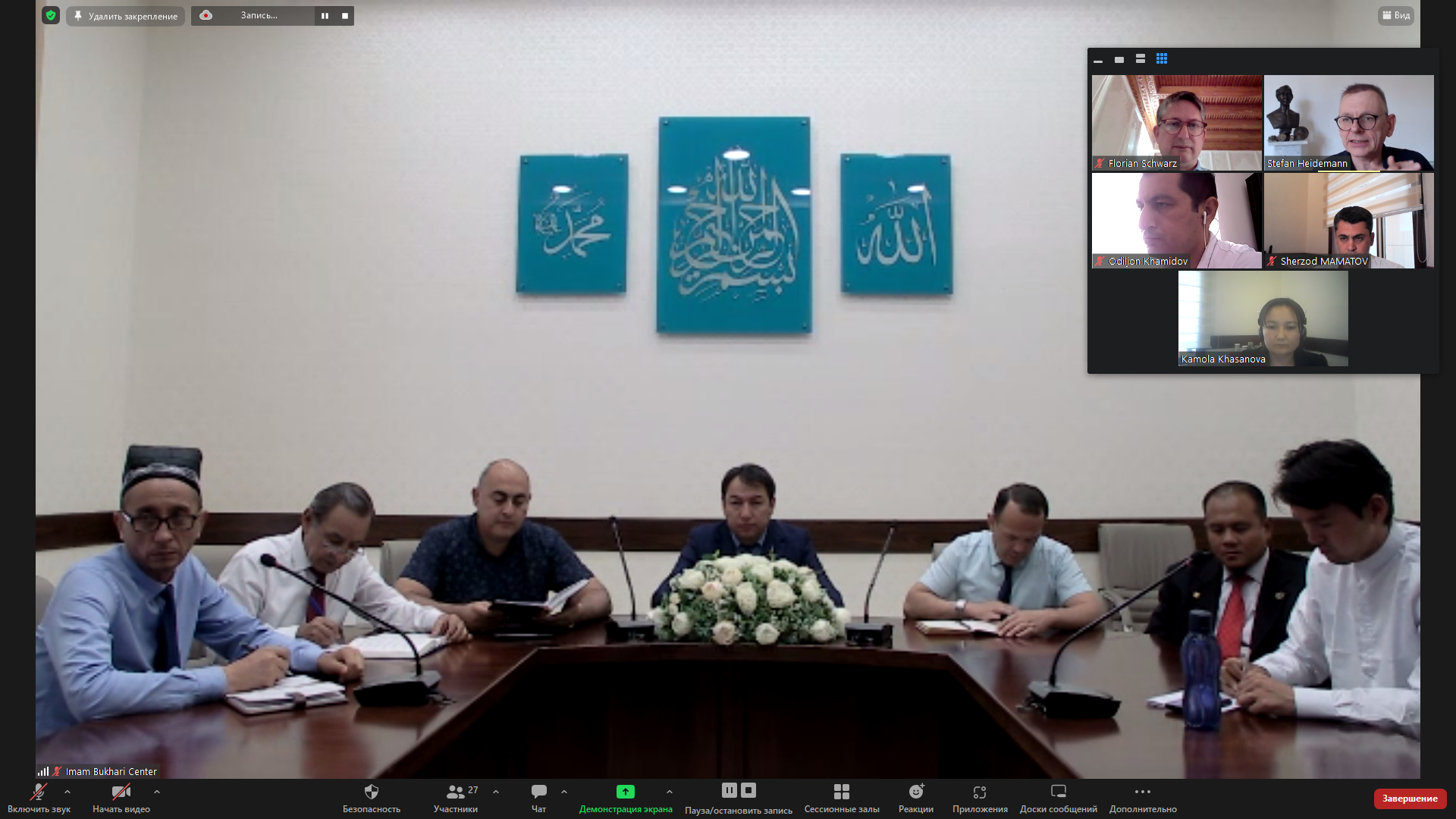
Bio of the Lecturer:
Florian Schwarz studied Iranian and Islamic Studies at the Universities of Tübingen and Cologne. 1999 Doctorate (Dr. phil.) at the University of Tübingen. 1996-1998 Research assistant at the Research Center for Islamic Numismatics at the University of Tübingen. 1999-2005 Research assistant at the Department of Oriental and Islamic Studies at the University of Bochum. 2005-2009 Assistant Professor at the Department of History at the University of Washington, Seattle. Since January 2010 Director of the Institute for Iranian Studies at the Austrian Academy of Sciences in Vienna. 2011 Appointed Honorary Professor at the University of Vienna. 2015 Elected Corresponding Member in Austria of the Austrian Academy of Sciences. Co-editor of the monograph series Veröffentlichungen zur Iranistik and Iranische Onomastic (Verlag der ÖAW) and the Handbuch der Orientalistik / Naher und Mittlerer Osten (Brill). Member of the scientific advisory board of the journals Der Islam (de Gruyter) and Rivista degli Studi Orientali (Sapienza University of Rome).
